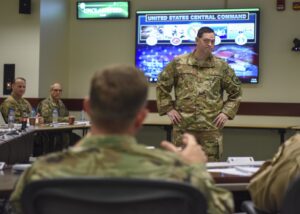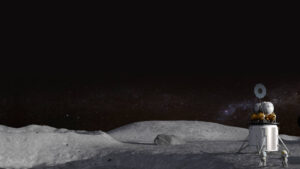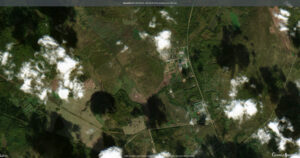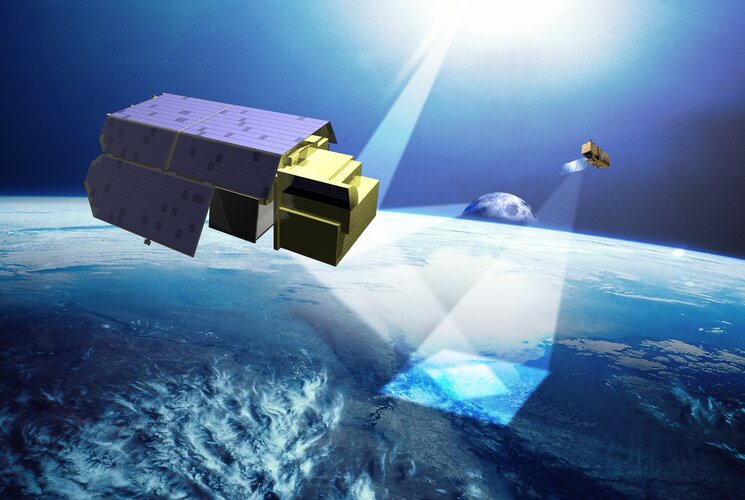Hypersonix to use Siemens' software in design of its hydrogen fuelled launchers
Thursday, 04 November 2021 04:36 Brisbane-based aerospace engineering start-up Hypersonix Launch Systems has chosen Siemens' Xcelerator portfolio of software to help design its sustainable and reusable hypersonic launch vehicle, Delta-Velos.
Hypersonix plans to implement advanced aerodynamic and thermal modelling software from Siemens' Simcenter portfolio, which will play a key role in building certainty and reliability o
Brisbane-based aerospace engineering start-up Hypersonix Launch Systems has chosen Siemens' Xcelerator portfolio of software to help design its sustainable and reusable hypersonic launch vehicle, Delta-Velos.
Hypersonix plans to implement advanced aerodynamic and thermal modelling software from Siemens' Simcenter portfolio, which will play a key role in building certainty and reliability o Sol 3285: Oh So Close
Thursday, 04 November 2021 04:36 The drive over the weekend was successful, gaining us more than 6 m in elevation - not bad for a weekend hike! Looking at this terrain, it is probably not surprising to you that looking uphill into the tilted bedrock slabs and thin resistant veins jutting up in all directions makes it hard to plan our next move.
Indeed, today's drive will take us close to the area where we want to drill ne
The drive over the weekend was successful, gaining us more than 6 m in elevation - not bad for a weekend hike! Looking at this terrain, it is probably not surprising to you that looking uphill into the tilted bedrock slabs and thin resistant veins jutting up in all directions makes it hard to plan our next move.
Indeed, today's drive will take us close to the area where we want to drill ne New Curtin study pinpoints likely home of Martian meteorites
Thursday, 04 November 2021 04:36 Curtin University researchers have pinpointed the likely origin of a group of meteorites ejected from Mars, using a machine learning algorithm that analyses high-resolution planetary images.
The new research, published in Nature Communications, identified meteorites that landed on Earth likely originated from Mars' Tooting crater, located in the Tharsis region, which is the largest volcani
Curtin University researchers have pinpointed the likely origin of a group of meteorites ejected from Mars, using a machine learning algorithm that analyses high-resolution planetary images.
The new research, published in Nature Communications, identified meteorites that landed on Earth likely originated from Mars' Tooting crater, located in the Tharsis region, which is the largest volcani UNI Bremen involved in AMADEE-20 Mars Simulation
Thursday, 04 November 2021 04:36 AMADEE-20: That is the name of the simulated Mars mission of the Austrian Space Forum, which was carried out in the Israeli Negev Desert. More than 25 experiments were carried out there. Two projects from the University of Bremen, namely INTERTEAM and MarsLock, were also involved in the research.
b>What are team processes like when the crew is on Mars? br> /b>
The INTERTEAM project addre
AMADEE-20: That is the name of the simulated Mars mission of the Austrian Space Forum, which was carried out in the Israeli Negev Desert. More than 25 experiments were carried out there. Two projects from the University of Bremen, namely INTERTEAM and MarsLock, were also involved in the research.
b>What are team processes like when the crew is on Mars? br> /b>
The INTERTEAM project addre Simulating galaxy formation for clues to the universe
Thursday, 04 November 2021 04:36 For all its brilliant complexity, the Milky Way is rather unremarkable as galaxies go. At least, that's how Mark Vogelsberger sees it. "Our galaxy has a couple features that might be a bit surprising, like the exact number of structures and satellites around it," Vogelsberger muses. "But if you average over a lot of metrics, the Milky Way is actually a rather normal place."
He should know.
For all its brilliant complexity, the Milky Way is rather unremarkable as galaxies go. At least, that's how Mark Vogelsberger sees it. "Our galaxy has a couple features that might be a bit surprising, like the exact number of structures and satellites around it," Vogelsberger muses. "But if you average over a lot of metrics, the Milky Way is actually a rather normal place."
He should know. China launches remote-sensing satellite group
Thursday, 04 November 2021 04:36 China launched a group of remote-sensing satellites from the Jiuquan Satellite Launch Center in northwest China on Wednesday.
The second group of the Yaogan-32 satellite family was launched by a Long March-2C rocket with an attached upper stage at 3:43 p.m. (Beijing Time) and entered the planned orbit.
This was the 394th mission of the Long March rocket series.
span class="BDL
China launched a group of remote-sensing satellites from the Jiuquan Satellite Launch Center in northwest China on Wednesday.
The second group of the Yaogan-32 satellite family was launched by a Long March-2C rocket with an attached upper stage at 3:43 p.m. (Beijing Time) and entered the planned orbit.
This was the 394th mission of the Long March rocket series.
span class="BDL Better hurricane forecasts with infrared satellite measurements of cloudy skies
Thursday, 04 November 2021 04:36 Weather forecast models have long struggled to integrate satellite observations of infrared radiation in cloudy regions of the sky. But in recent years, some satellite data providers have developed new techniques to integrate such data. A group of researchers from China, Japan, the US and the UK have performed a survey of best practice for the observation and use of this data, demonstrating sign
Weather forecast models have long struggled to integrate satellite observations of infrared radiation in cloudy regions of the sky. But in recent years, some satellite data providers have developed new techniques to integrate such data. A group of researchers from China, Japan, the US and the UK have performed a survey of best practice for the observation and use of this data, demonstrating sign On ancient Earth, it never rained but it poured
Thursday, 04 November 2021 04:36 Today, we are experiencing the dramatic impacts that even a small increase in global temperatures can have on a planet's climate. Now, imagine an Earth 20 to 30 degrees Fahrenheit hotter than today. Earth likely experienced these temperatures at various times in the distant past and will experience them again hundreds of millions of years from now as the sun continues to brighten.
Little i
Today, we are experiencing the dramatic impacts that even a small increase in global temperatures can have on a planet's climate. Now, imagine an Earth 20 to 30 degrees Fahrenheit hotter than today. Earth likely experienced these temperatures at various times in the distant past and will experience them again hundreds of millions of years from now as the sun continues to brighten.
Little i New look for ground-breaking UK-led ESA mission to detect climate change
Thursday, 04 November 2021 04:36 TRUTHS, which stands for Traceable Radiometry Underpinning Terrestrial- and Helio- Studies, will provide a gold standard reference for satellites observing the Earth, Moon and Sun.
Conceived by the UK's National Physical Laboratory (NPL) and funded by the UK Space Agency, TRUTHS is being developed by the European Space Agency (ESA). The satellite will be built by the UK space industry led
TRUTHS, which stands for Traceable Radiometry Underpinning Terrestrial- and Helio- Studies, will provide a gold standard reference for satellites observing the Earth, Moon and Sun.
Conceived by the UK's National Physical Laboratory (NPL) and funded by the UK Space Agency, TRUTHS is being developed by the European Space Agency (ESA). The satellite will be built by the UK space industry led Small but Mighty NASA Weather Instruments Prepare for Launch
Thursday, 04 November 2021 04:36 Working together, two instruments could open the door for a more efficient, cost-effective way to gather key information for weather forecasting. Two instruments launching to the International Space Station in a few weeks could be weather-forecasting game changers. The two novel instruments are expected to demonstrate that while they are much smaller, much lighter, and much less expensive than w
Working together, two instruments could open the door for a more efficient, cost-effective way to gather key information for weather forecasting. Two instruments launching to the International Space Station in a few weeks could be weather-forecasting game changers. The two novel instruments are expected to demonstrate that while they are much smaller, much lighter, and much less expensive than w FCC approves Boeing’s 147-satellite V-band constellation
Wednesday, 03 November 2021 20:41
The Federal Communications Commission has approved Boeing’s application to develop and operate 147 non-geostationary (NGSO) broadband satellites.
One way to help prevent wars in space? Military hotlines with Russia and China
Wednesday, 03 November 2021 20:25
With space now considered a domain of war, hotlines between U.S. and foreign rivals might be worth contemplating, said Lt. Gen. B. Chance Saltzman, deputy chief of operations of the U.S.
SpaceFund to invest in navigation system for cislunar space
Wednesday, 03 November 2021 16:31
Venture investor SpaceFund announced Nov. 3 it plans to finance the development of an autonomous navigation capability for space missions beyond Earth orbit in the region known as cislunar space.
National Reconnaissance Office launches new procurement of commercial satellite imagery
Wednesday, 03 November 2021 15:32
The National Reconnaissance Office on Nov. 3 released a request for bids from U.S. commercial providers of satellite imagery.
TRUTHS shapes up
Wednesday, 03 November 2021 14:00
ESA’s new TRUTHS mission is taking shape. Highlighted today at COP26, this new mission is moving from its feasibility phase into its preliminary design phase. TRUTHS is set to provide measurements of incoming solar radiation and of radiation reflected from Earth back out into space as traceable International System of Units. These measurements will allow changes in Earth’s climate to be detected faster, and they will be used to calibrate data from other satellites. In effect, TRUTHS will be a ‘standards laboratory in space’, setting the ‘gold standard’ for climate measurements.
